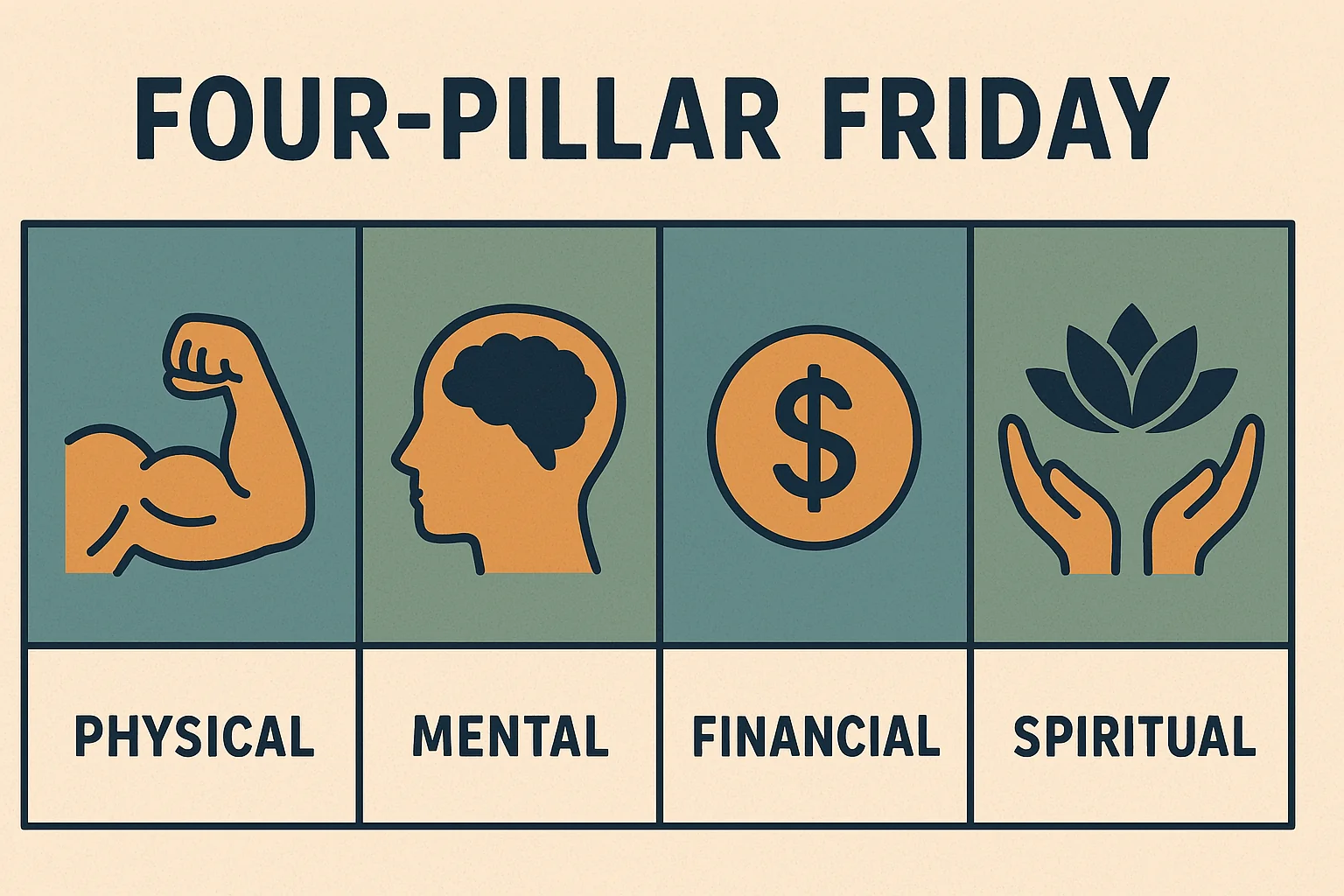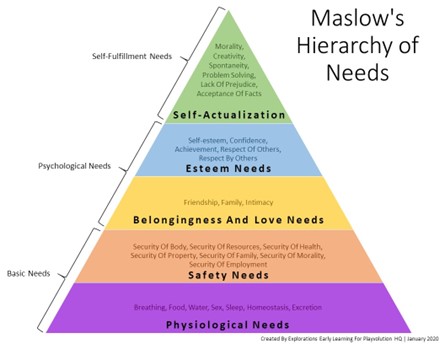
Four Pillar Friday
Your weekly guide to thriving in every aspect of life—Physical, Mental, Spiritual, and Financial Wellness.

Navigating the "One Big, Beautiful Bill": Key Tax Proposals and Your Financial Future
Washington is abuzz over the newly passed “One Big, Beautiful Bill” Act—a sweeping House tax package that could reshape how Americans earn, save, and transfer wealth.

Mid-Quarter Market Commentary
Markets don't move in straight lines—and April was a vivid reminder. A resurgence of volatility rattled both stocks and bonds, with tariff tensions, lofty equity valuations, and shifting Fed expectations fueling uncertainty. Yet amid the noise, long-term fundamentals remain intact. At Journey Wealth, we believe these moments reinforce—not challenge—the value of a well-diversified portfolio grounded in your personal financial goals. From the resilience of international markets to the renewed attractiveness of fixed income, this month’s recap unpacks what’s driving market dynamics—and how thoughtful planning can help you stay on course through whatever comes next.

Four Pillar Friday
Your weekly guide to thriving in every aspect of life—Physical, Mental, Spiritual, and Financial Wellness.

Four Pillar Friday
Your weekly guide to thriving in every aspect of life—Physical, Mental, Spiritual, and Financial Wellness.

More Than Money: How Trusts Can Support the People They’re Meant to Help
Traditional trusts focus on asset protection and tax efficiency—but is that enough? This article explores a modern approach to trust design that prioritizes the well-being of beneficiaries through financial education, family engagement, and personal development.

Four Pillar Friday
Your weekly guide to thriving in every aspect of life—Physical, Mental, Spiritual, and Financial Wellness.

Preparing for the Exit: What Entrepreneurs Often Miss
There’s a quieter side of the sale that rarely makes it into the spreadsheets.

Four Pillar Friday
Your weekly guide to thriving in every aspect of life—Physical, Mental, Spiritual, and Financial Wellness.

Volatility is Normal — So Is Growth: What 45 Years of Market History Can Teach Investors
Sharp market drops are unsettling, but they don’t have to derail your financial plan. Learn how long-term investors have historically been rewarded for staying the course during volatile times.

Four Pillar Friday
Your weekly guide to thriving in every aspect of life—Physical, Mental, Spiritual, and Financial Wellness.

Four Pillar Friday
Your weekly guide to thriving in every aspect of life—Physical, Mental, Spiritual, and Financial Wellness.

Quarterly Market Commentary
After a banner year for domestic equities in 2024, 2025 is off to a bumpier start. The volatility in the first quarter was largely a product of the concentration of the S&P 500 in a handful of names, along with elevated valuations. In 2024, the seven largest stocks in the S&P 500 accounted for over half of the Index’s gains.

Four Pillar Friday
Your weekly guide to thriving in every aspect of life—Physical, Mental, Spiritual, and Financial Wellness.

Why We’re Richer Than Ever, But Not Necessarily Happier
Money solves the math—life asks for more.

Four Pillar Friday
Your weekly guide to thriving in every aspect of life—Physical, Mental, Spiritual, and Financial Wellness.

Four Pillar Friday
Your weekly guide to thriving in every aspect of life—Physical, Mental, Spiritual, and Financial Wellness.

The Future of Holistic Wealth Advice: More Than Just a Trend—It’s an Evolution
Is it time to start looking at holistic wellness as part of the portfolio?

When the Headlines Feel Bigger Than the History
Why volatility isn’t the enemy, but emotional decision-making is.

Four Pillar Friday
Your weekly guide to thriving in every aspect of life—Physical, Mental, Spiritual, and Financial Wellness.

Four Pillar Friday
Your weekly guide to thriving in every aspect of life—Physical, Mental, Spiritual, and Financial Wellness.

The Hidden Costs of ‘Waiting Until Later’ on Your Health, Wealth, and Mindset
Waiting until 'later' isn’t just a delay—it’s a costly decision your future self will wish you hadn’t made.

Four Pillar Friday
Your weekly guide to thriving in every aspect of life—Physical, Mental, Spiritual, and Financial Wellness.

Mid-Quarter Market Commentary
While the Fed and the market are fairly aligned in their expectations, fixed income markets are likely to remain somewhat volatile while the fiscal impacts of the new administration’s policies become clearer. However, higher yields insulate bond investors from interest rate risk and elevated equity valuations make bonds more attractive on a relative basis. Given the level of concentration within US equity markets, we believe that international, value and small-cap equities provide a critical element of diversification. We advocate building portfolios to achieve your long-term goals as opposed to trying to react to the latest headlines. Please don’t hesitate to reach out to your advisor to schedule time to discuss your financial plan, including your goals and planning assumptions.

Four Pillar Friday
Your weekly guide to thriving in every aspect of life—Physical, Mental, Spiritual, and Financial Wellness.

Debunking Investing Myths
Every investor has heard at least one “rule of thumb” that sounds too simple—or too ominous—to be true. Some of these “tried and tested” maxims come from decades of market folklore; others are simply repeated so often they start to feel like fact. In this post, we’ll debunk six common investing myths using historical data and a long-term perspective.

Rethinking Education for Fulfillment and Financial Well-Being
If we want to set the next generation up for success, we need to go beyond achievement and income. We need to help them invest in their strengths, align their financial choices with their values, and build lives of purpose, impact, and fulfillment.

Four Pillar Friday
Your weekly guide to thriving in every aspect of life—Physical, Mental, Spiritual, and Financial Wellness.

The Generosity Gap: Balancing Support and Independence in Families
When approached thoughtfully, wealth can be a catalyst for growth and opportunity rather than a source of conflict. Families that prioritize clear communication, shared values, and personal accountability are better positioned to navigate the challenges of the generosity gap.

Maximizing Your Cleveland Clinic Retirement Benefits: What You Need to Know
Working at Cleveland Clinic comes with a variety of financial perks—chief among them are the retirement plans that can help you build long-term wealth. Understanding how to leverage each plan fully can feel overwhelming. Below, we break down the key features of the 401(a), 403(b), and 457(b) plans, plus the Equity Accumulation (EA) program. We’ll also explain how to implement a “mega backdoor Roth” strategy within the 403(b), so you can take your retirement savings to the next level.

Four Pillar Friday
Your weekly guide to thriving in every aspect of life—Physical, Mental, Spiritual, and Financial Wellness.

Missing the Best Days in the Market: The Up and Downs of Staying Invested

Core Values: The Intersection of Wealth and Wellness
Your weekly guide to thriving in every aspect of life—Physical, Mental, Spiritual, and Financial Wellness.

Four Pillar Friday
Your weekly guide to thriving in every aspect of life—Physical, Mental, Spiritual, and Financial Wellness.

Q1 2025 Market Commentary
Historically, attempting to time markets and chase the latest winners has proven to be a poor investment strategy. While some investors can be captivated by recent return trends, it’s critical to understand how your investments are working together to achieve your financial goals. Constructing an investment allocation that fits with your unique financial plan reduces the temptation to chase shiny objects.

Four Pillar Friday
Your weekly guide to thriving in every aspect of life—Physical, Mental, Spiritual, and Financial Wellness.

What Noel and Liam Gallagher Can Teach Us About Estate Planning
The Gallagher brothers’ reunion reminds us that family conflicts can be mended—but in estate planning, clear communication, thoughtful succession, and professional guidance are key to preserving relationships and legacy.

The Role of Emotions and Behavior in Your Financial Journey
When it comes to managing your finances, it’s easy to focus solely on numbers—budgeting, investments, retirement goals. But what often gets overlooked is the emotional and behavioral side of money.

Four Pillar Friday
Your weekly guide to thriving in every aspect of life—Physical, Mental, Spiritual, and Financial Wellness.

Leading the Family Business: Legacy, Emotions, and Growth
Family businesses are unique because they carry both the weight of history and the promise of the future.

Fueling the Pursuit of a Life Well Lived
From my experience working with wealth management clients, I’ve noticed a common thread among those who find real fulfillment in their financial success. They view money not as the end goal but as a vehicle—a means to pursue what matters most. It’s the foundation that lets them start a foundation, create lasting memories with loved ones, or explore new interests without constraints.

What is Wealth?
According to Investopedia “wealth is measured by taking the value of all the assets of worth owned by a person. This is determined by taking the total market value of all physical and intangible assets owned, then subtracting all debts. Essentially, wealth is the accumulation of scarce resources.”

How Many Summers?
After my first son was born, I began to think about what the next phase of our lives looked like. We went from two busy professionals who could hop on a plane for a weekend trip, grab dinner, or chase endless weekend adventures to first time parents. We were 2,000 miles away from family trying to plan the one or two trips a year that we could see them which led me to ask this question, how many summers do we have left?

The Power of Time
Our humans are brains are instinctively wired to prioritize immediate needs and wants, such as quenching hunger, ensuring safety, or yielding to the allure of instant gratification. This is a survival mechanism that has evolved over tens of thousands of years to help us respond to threats, opportunities, and ultimate survival. However, this tendency to emphasize the short term can be counterproductive and have a detrimental effect when it comes to planning and our financial success.

Last One Out
“Hey, do you want to grab onto the kayak?” These words echoed in my ears as I struggled through the swim portion of my first Olympic distance triathlon. There I was floundering in the water, struggling to breathe, and flopping between a bad backstroke and freestyle. I lifted my head and painfully realized I was the last one in the lake.

Embracing the Spectrum of Emotions
Investing can be an emotional roller coaster, with the excitement of portfolio growth followed by the panic of market downturns. This emotional ride is rooted in the experience of loss aversion, a psychological principle suggesting the pain felt from financial loss is twice as potent as the pleasure experienced from a similar gain. However, it's crucial to recognize that allowing our emotions to guide our investment decisions can lead to irrational choices.

Charting the Course
Our humans are brains are instinctively wired to prioritize immediate needs and wants, such as quenching hunger, ensuring safety, or yielding to the allure of instant gratification. This is a survival mechanism that has evolved over tens of thousands of years to help us respond to threats, opportunities, and ultimate survival. However, this tendency to emphasize the short term can be counterproductive and have a detrimental effect when it comes to planning and our financial success.

Small Steps, Giant Leaps: A Journey of 22 Years
Our humans are brains are instinctively wired to prioritize immediate needs and wants, such as quenching hunger, ensuring safety, or yielding to the allure of instant gratification. This is a survival mechanism that has evolved over tens of thousands of years to help us respond to threats, opportunities, and ultimate survival. However, this tendency to emphasize the short term can be counterproductive and have a detrimental effect when it comes to planning and our financial success.

The Intersection of Health and Wealth
A recent study conducted by Fidelity found that healthcare and medical expenses for a 65-year-old retiring in 2021 are expected to surpass $300,000 throughout retirement. This represents a 30% increase from a decade ago and a staggering 88% rise from twenty years ago.

Lessons from 234,000 Steps
Our humans are brains are instinctively wired to prioritize immediate needs and wants, such as quenching hunger, ensuring safety, or yielding to the allure of instant gratification. This is a survival mechanism that has evolved over tens of thousands of years to help us respond to threats, opportunities, and ultimate survival. However, this tendency to emphasize the short term can be counterproductive and have a detrimental effect when it comes to planning and our financial success.

Be Like Lebron
Our humans are brains are instinctively wired to prioritize immediate needs and wants, such as quenching hunger, ensuring safety, or yielding to the allure of instant gratification. This is a survival mechanism that has evolved over tens of thousands of years to help us respond to threats, opportunities, and ultimate survival. However, this tendency to emphasize the short term can be counterproductive and have a detrimental effect when it comes to planning and our financial success.

Hanging with 20,000 of my Closest Friends
Our humans are brains are instinctively wired to prioritize immediate needs and wants, such as quenching hunger, ensuring safety, or yielding to the allure of instant gratification. This is a survival mechanism that has evolved over tens of thousands of years to help us respond to threats, opportunities, and ultimate survival. However, this tendency to emphasize the short term can be counterproductive and have a detrimental effect when it comes to planning and our financial success.

The Talk You Shouldn't Skip with Your Kids
Our humans are brains are instinctively wired to prioritize immediate needs and wants, such as quenching hunger, ensuring safety, or yielding to the allure of instant gratification. This is a survival mechanism that has evolved over tens of thousands of years to help us respond to threats, opportunities, and ultimate survival. However, this tendency to emphasize the short term can be counterproductive and have a detrimental effect when it comes to planning and our financial success.

It's Just 7,905 Miles to My Closest Friends
Our humans are brains are instinctively wired to prioritize immediate needs and wants, such as quenching hunger, ensuring safety, or yielding to the allure of instant gratification. This is a survival mechanism that has evolved over tens of thousands of years to help us respond to threats, opportunities, and ultimate survival. However, this tendency to emphasize the short term can be counterproductive and have a detrimental effect when it comes to planning and our financial success.

When Silence Costs a Fortune
Our humans are brains are instinctively wired to prioritize immediate needs and wants, such as quenching hunger, ensuring safety, or yielding to the allure of instant gratification. This is a survival mechanism that has evolved over tens of thousands of years to help us respond to threats, opportunities, and ultimate survival. However, this tendency to emphasize the short term can be counterproductive and have a detrimental effect when it comes to planning and our financial success.

The Experience Mickey Built
Our humans are brains are instinctively wired to prioritize immediate needs and wants, such as quenching hunger, ensuring safety, or yielding to the allure of instant gratification. This is a survival mechanism that has evolved over tens of thousands of years to help us respond to threats, opportunities, and ultimate survival. However, this tendency to emphasize the short term can be counterproductive and have a detrimental effect when it comes to planning and our financial success.

Enjoy the Ride (...and the Fries)
Investing can be an emotional roller coaster, with the excitement of portfolio growth followed by the panic of market downturns. This emotional ride is rooted in the experience of loss aversion, a psychological principle suggesting the pain felt from financial loss is twice as potent as the pleasure experienced from a similar gain. However, it's crucial to recognize that allowing our emotions to guide our investment decisions can lead to irrational choices.
